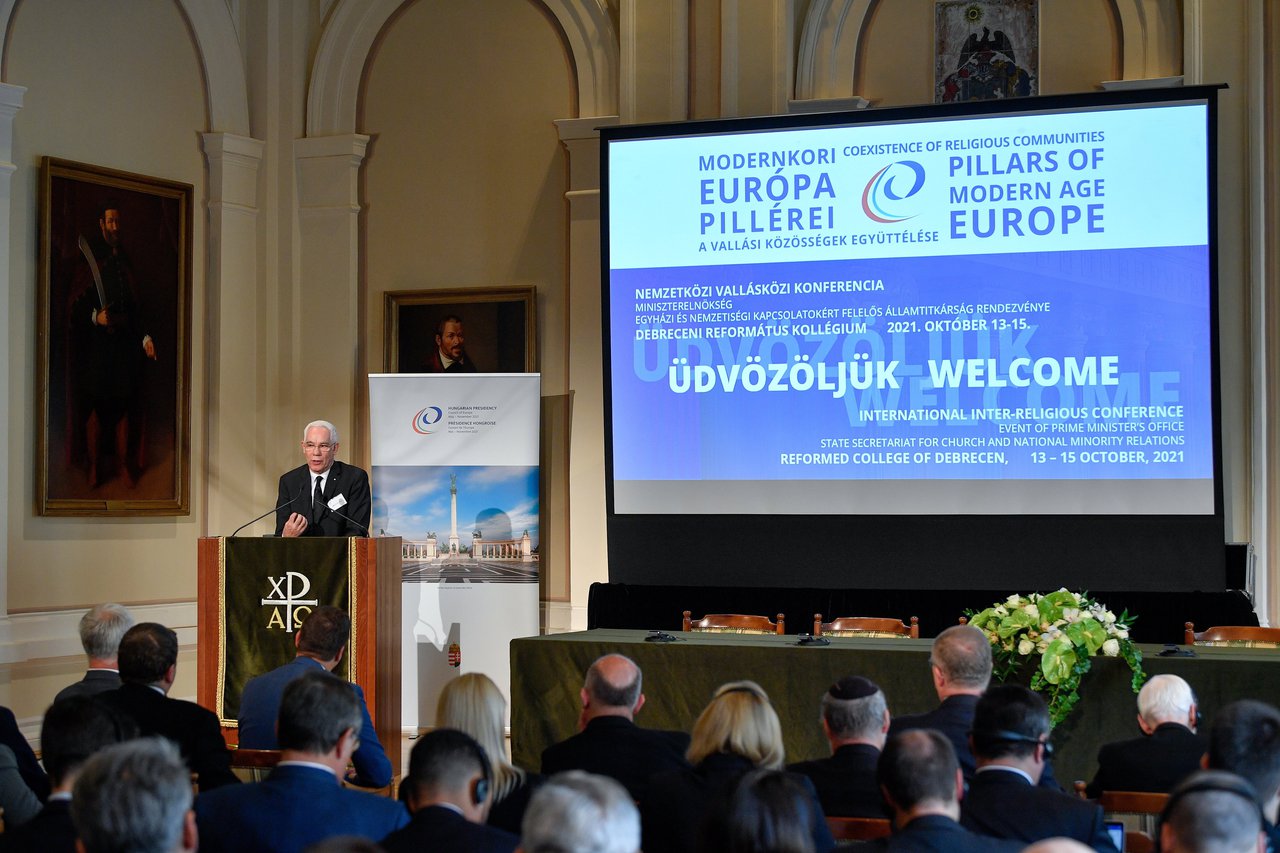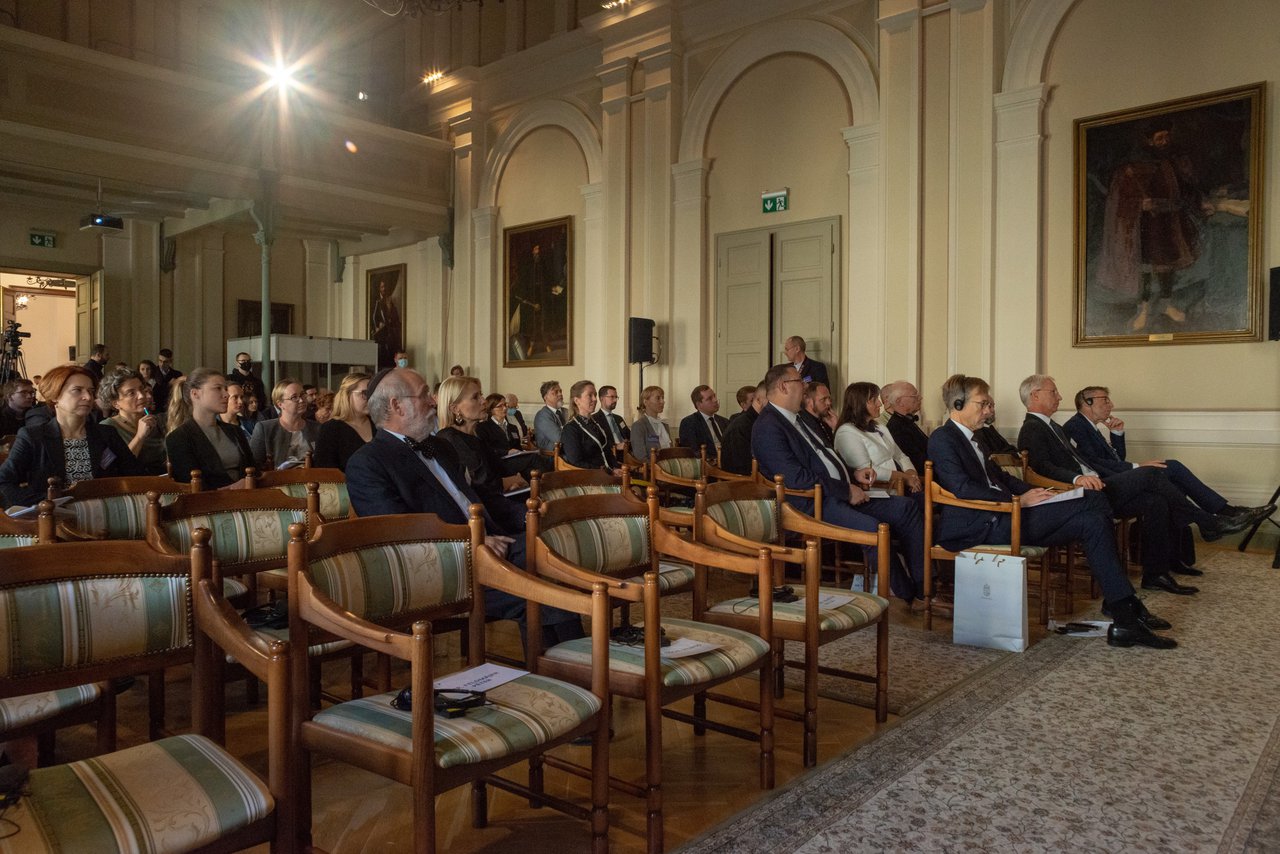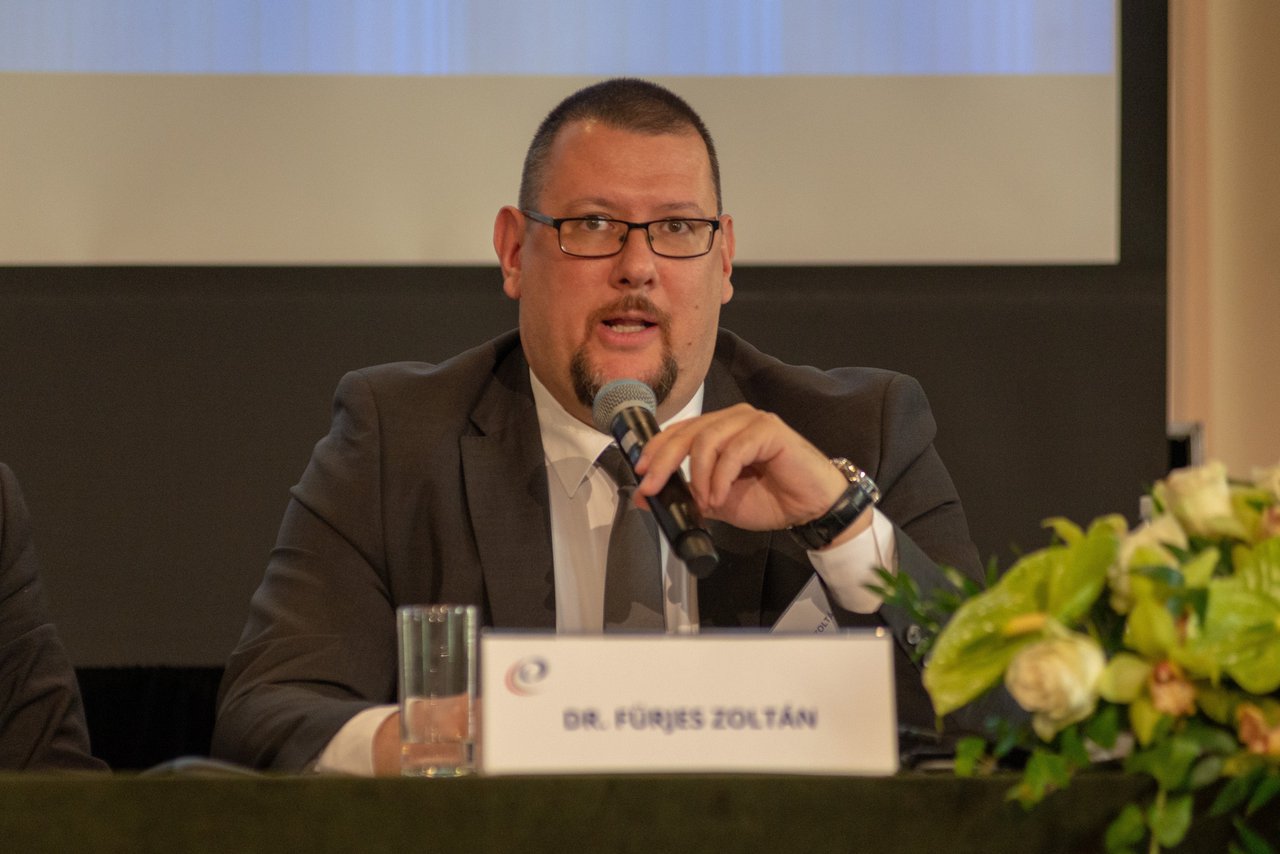The religious foundations of the values of European civilisation, the role of family, the protection of life, hidden or open anti-religion in Europe, are just some of the serious issues addressed by the participants of the interreligious conference entitled the Pillars of Modern Age Europe - coexistence of religious communities. The meeting was hosted by the Reformed College in Debrecen from 13 to 15 October. The conference was organised by the State Secretariat for Church and National Minority Relations of the Prime Minister's Office.
Between May and November, Hungary holds chairmanship of the Committee of Ministers of the Council of Europe. Promoting interfaith dialogue is an important element of the Council of Ministers' work, which is why the conference took place in Debrecen last week.
The Council of Europe is a loose alliance, but it often has power and a message, Miklós Soltész stressed in an interview with reformatus.hu. The organisation has 47 member countries from the Caspian Sea to the Atlantic Ocean. During the Hungarian chairmanship, two important topics have been given priority, namely the role of religion and that of nations and nationalities in modern society. The first meeting was attended by a number of European political and Church representatives, and the organisers hope to broaden the scope of the debate. The Secretary of State for Churches, Minorities and Civil Affairs of the Prime Minister's Office talked about the importance “that those present understand, how certain nations and communities, including religious communities penetrate and shape our region. Unfortunately, this is something people in Western Europe tend to forgot. We want our way of thinking and our aspirations not only to be expressed in words, but also to be lived out," said Miklós Soltész.

Bishop Zoltán Balog, Ministerial President of the Synod of the Reformed Church in Hungary, speaks at the conference entitled "Pillars of modern Age Europe - the coexistence of religious communities" at the Reformed College in Debrecen
THE SAVING POWER OF FAITH
Bishop Zoltán Balog spoke about the growing differences between the churches of Western and Central Europe. The ministerial president of the Synod of the Reformed Church of Hungary referred to the historical experience showing that if we do not keep our faith, we not only loose the faith itself, but we ourselves are lost as well. According to the Bishop this awareness seems to fade away in Western Europe. “If there had been no Reformation in the 16th century, Hungarians today would speak either German, Russian or Turkish, writes the historian István Nemeskürthy. This means that our faith can keep our nation alive,” the Reformed bishop said, adding that in recent days churches have become one of the most important allies of the Hungarian state, with a strengthened role in child protection, the school system, in social, diaconal and charity field. “We claim, and this is insight is based on the Bible, that the questions of humankind remains always the same That is why it is the biblical tradition that can give us guidance. We can recognize and know ourselves and God in the light of the revelation, and thus discover true life," Zoltán Balog stressed.
According to the Reformed leader, the task for the churches is not to adapt and adjust themselves to the world, but to take the task seriously of recognizing the reality of life of today's man. It is also important for churches to be interpreters of God's word: they must be able to translate the message of the Bible for today's man without changing it.

The conference took place in the banquet hall of the Reformed College in Debrecen
OUR COMMON VALUES
“We are living in a time of cultural struggle in Europe, in a certain sense extended to the Western world, in which the civilisation of the civilisation of the free world, rooted in the past, is fighting against the culture of abolition, renewal or, as Pope John Paul II said, the culture of death. The stakes are huge, and the question is whether Europe still has common values. At the moment, we can still answer with yes, but those joint values are fewer and fewer," said Gergely Gulyás, Minister of the Prime Minister's Office.
According to Gergely Gulyás, materialism that is increasingly present in the present ideological conflict in Europe wants to make us believe that everything that is visible is more valuable than the invisible. The Minister underlined that the societies of Central Europe have a concrete experience of the dictatorial imposition of Soviet-style way thinking and the forced identification with any ideology means the end of freedom. Destroying religious values and imposing a new ideology is a straight way that leads to the loss of freedom”, the minister said. He quoted the famous phrase of former prime minister József Antall, saying that in Europe even atheists are Christians. “This statement was true thirty years ago, but today's zeitgeist aims – the other way around - to make Christians atheists,” warned Gergely Gulyás. In relation with Western and Eastern Europe he added: "while we have a lot to do to catch up economically, we have to make clear that we want to avoid a similar social development in the future as to what happened in Western Europe in the past. In our country, we are now experiencing a Christian renaissance, which is not based on politics, but on faith”.

Zoltán Fürjes, Deputy State Secretary for Church and National Relations of the Prime Minister's Office
A PLACE TO BRING FORTH LIFE
The conference also included round table discussions, one of which focused on the moral challenges of the 21st century, including the role of the family and the protection of life. Zoltán Fürjes, Deputy State Secretary for Church and National Relations of the Prime Minister's Office, chaired the discussion. He was joined by Edit Frivaldszky, Director of the Human Dignity Center, Marc Fromager, Director of Mission Ismérie - a French religious organisation - and former Director of the Church in Need, Tünde Fűrész, President of the Maria Kopp Institute for Demography and Families and Katalin Hekli, Pastor of the Rákospalota-Óváros Reformed congregation. In the discussion participants emphasized that the family is a space for passing on life (procreation), and not just an agent of socialisation. Today, many people sacrifice the beauty of having children for the sake of convenience and comfort, and the number of divorces are increasing also among Christians. For example in France, two thirds of marriages blessed in Christian wedding ceremony ends with divorce. As a result, children do not see the right role model and cannot pass it on. There is also a lack of quality time together in families and authentic attention to each other. The conclusion was that the wounds on the family can be healed through prevention and parental education. As a well-known catholic priest formulated it, the "care for marriage is a way of preventive child protection", and the churches have an important role to play in this.
DISCRIMINATION of religion
On the final day of the conference, György Hölvényi gave a presentation on Hidden and open anti-religious discrimination in Europe. In his speech, the member of the EPP Group and the Subcommittee on Human Rights of the European Parliament pointed out that in Central and Eastern Europe, it does not matter whether one is a believer or not, because the role of religion in shaping society is recognised and considered important, while in Western Europe a kind of religious indifference has developed. “We are in an anti-religious cramp,” said the MEP, stressing that there is no religious persecution, but religious discrimination in Europe, which is why the role of churches in keeping the peace is so urgent.
DIALOGUE TO BE CONTINUED
The conference ended with the closing remark of Miklós Soltész. The Minister of State of the Prime Minister's Office stressed that the actual problem is not the way how Western Europe lives and operates, but the fact that they want to impose their opinions on us. "The important thing is that values that are based in the tradition of the ancient, Christian and Jewish roots, which hold us together and strengthen us, can be found throughout Europe.”
The meeting will continue in November in Budapest on the theme of nations and nationalities.
Hungary took over the chairmanship of the Council of Ministers of the Council of Europe (CoE) from Germany last May. The Hungarian Presidency’s program will run until Nov. 17.
The Secretary General’s Special Representative on antisemitic, anti-Muslim and other forms of religious intolerance and hate crimes, spokeperson Daniel Höltgen welcomed Hungary’s initiative to promote the interreligious dimension of intercultural dialogue with this important conference as part of its Council of Europe Presidency.
"No-one should be targeted for what they believe or do not believe. The fight against discrimination, including on grounds of religion or belief, has been at the core of the Council of Europe’s mission from the outset. We have been active in promoting interreligious dialogue and we have a long tradition of supporting Holocaust remembrance. Sharing this knowledge will be an important part of my work with my counterparts, including the representatives on antisemitism and anti-Muslim hatred of the OSCE, EU and member states," highlights Höltgen his responsibility as special representative.